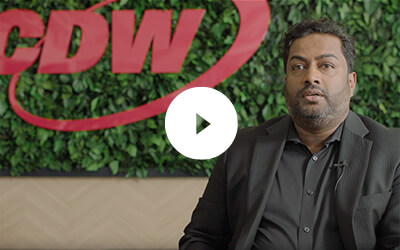-
Solutions
Back
Digital Trust for:
Enterprise IT, PKI & Identity
Code & Software
Documents & Signing
IoT & Connected Devices
Manage PKI and Certificate risk in one place
Manage PKI and Certificate risk in one place
The smarter way to manage certificate lifecycles
Continuous Signing for CI/CD & DevOps
Secure, flexible and global signing
Trusted from silicon to in-the-field
Device security without compromise
Accelerate secure app development
Streamlined Certificate
Management and Automation:
Delivering At-Scale Uptime and Availability
2022 Edition of the TLS/SSL Best Practices Guide
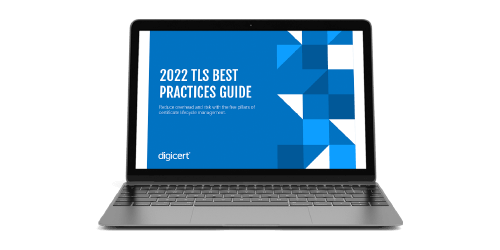
2022 Edition of the TLS/SSL Best Practices Guide

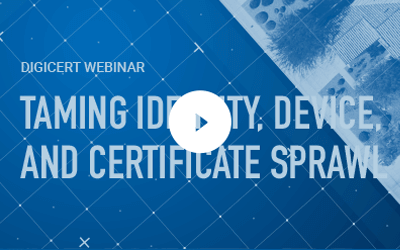
How to establish a signing policy DevOps will actually adopt
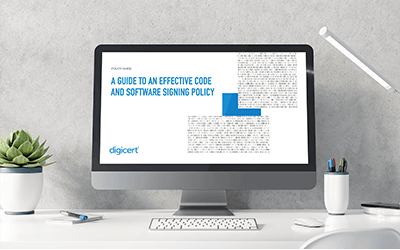
Global perspective on managing document signing and regulations
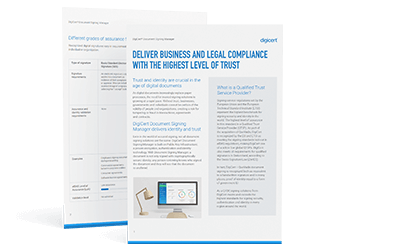
Secure, update, monitor and control connected devices at scale
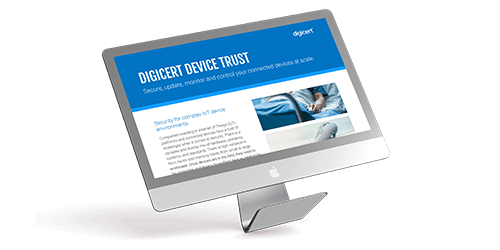
Secure, update, monitor and control connected devices at scale

Secure, update, monitor and control connected devices at scale

Secure, update, monitor and control connected devices at scale
DOWNLOAD NOW -
Buy
BackWildcard DomainBUY
Find the right TLS/SSL Certificate to secure your website
eIDAS-compliant transaction and website document security solutions
-
Insights
Back
Digital Trust for the Real World
Explore these pages to discover how DigiCert is helping organizations establish, manage and extend digital trust to solve real-world problems.
Ponemon Institute Report
See what our global post-quantum study uncovered about where the world stands in the race to prepare for quantum computing.
LEARN MORE >
-
Partners
Back
-
Support
Back
CONTACT OUR SUPPORT TEAM
- Americas
- 1.866.893.6565 (Toll-Free U.S. and Canada)
- 1.801.770.1701 (Sales)
- 1.801.701.9601 (Spanish)
- 1.800.579.2848 (Enterprise only)
- 1.801.769.0749 (Enterprise only)
- Europe, Middle East Africa
- +44.203.788.7741
- Asia Pacific, Japan
- 61.3.9674.5500
- Americas
- Contact us
- Language

Digital Security FAQ
-
-
Industry Standards for Security & Trust
DigiCert is the global leader in providing high-assurance TLS/SSL certificates and automated solutions to manage and deliver trust across all PKI, IoT and signing workflows.
This FAQ is designed to provide quick answers to the most frequently asked questions about security topics that we can help our customers address, including:
- TLS/SSL certificates
- PKI Automation
- Certificate Management & Discovery
- Site Seals
- Verified Mark Certificates for DMARC-enforced brands
- EU-qualified and eIDAS certificates
- Public and Private PKI Management
- End-to-end Device Management for IoT
- Continuous signing of Code and Software for CI/CD pipelines and DevOps
- Signature trust and Document Signing workflows that are legally valid around the world.
For the latest Cybersecurity news & press updates, read our Blog and Press Releases.
-
Company
-
My Account
-
Resources
-
Solutions
-
© 2024 DigiCert, Inc. All rights reserved.
Legal Repository Audits & Certifications Terms of Use Privacy Center Accessibility Cookie Settings


